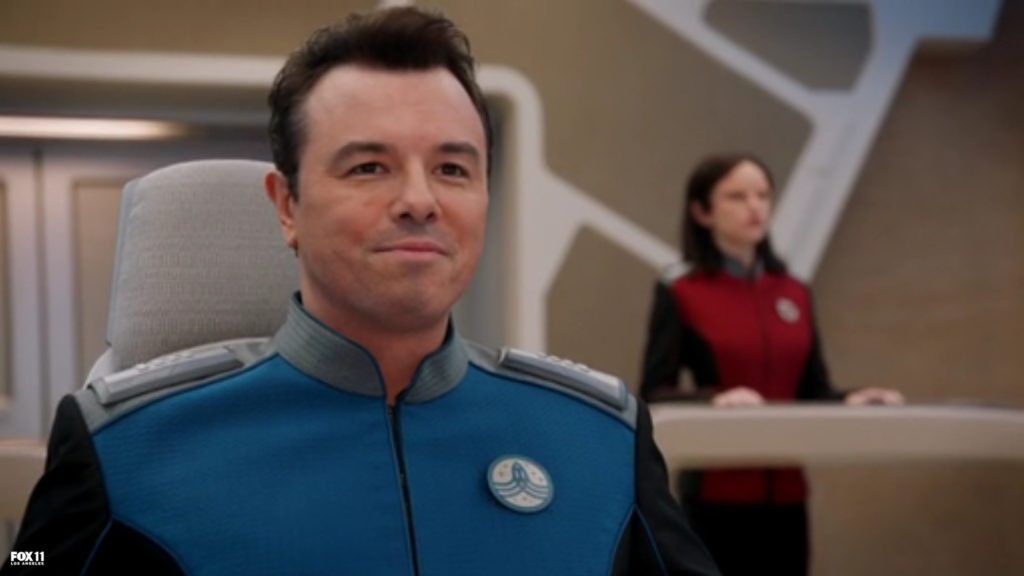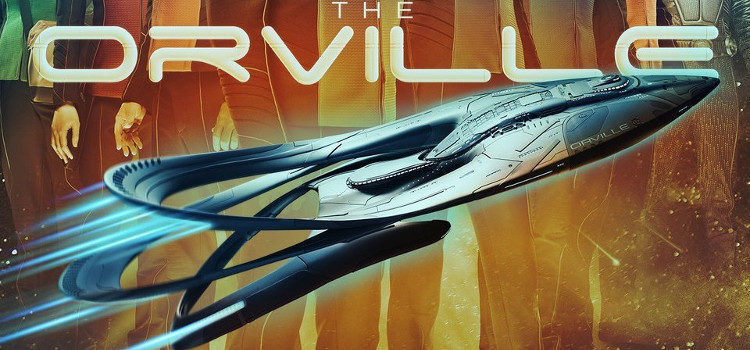The Orville is a riff of Star Trek the Next Generation from Seth McFarlane, creator of Family Guy/American Dad and resurrector of Cosmos. It’s a problematic mess:1 four fifths played straight, one fifth misogynistic humor and dick jokes, with none of it working, and I doubt the show-runners have the deftness to fix it. Imagine if Encounter at Farpoint had opened with Captain Picard walking in on his wife having sex with a blue alien that proceeded to stain the room, and you have the tone.
However there is a moment in the Orville that spoke to me:2

It’s a picture of the captain in his chair, taking his command out of dock for the first time, and it’s a moment of sincere joy. I love Star Trek and I dreamed of being a starship captain: I imagine that if my dreams had come true I would have worn a smile very similar to that. This connected with something fundamental in my character, and carried me over the many maddening problems of the show.
Indeed this type of emotion, a genuine smile, is something I find lacking from Star Trek. There is a certain ‘house style’ to Star Trek and its spinoffs, and when it tries to show personal emotions, particularly joy, it feels demonstrative. In contrast this moment feels like a personal one. There are certainly moments like this in Star Trek, my favourite for example the look on William Shatner’s face when he is buried in a pile of tribbles, but it’s not where the series strengths lie.
Unfortunately, like everything else on the show this moment is tainted. The very last scene of the first episode has the First Officer, who is also the captain’s ex-wife, talking with the admiral in charge of ship assignments and we find out that Mercer only got the job because of the First Officer’s family connections. This is meant to be a moment of redemption for Arianne Palicki’s character, showing that in spite of her mistake, she really does mean well for her captain/ex.
What it really does however is kick at the heart of my fantasy. In Star Trek, particularly TNG, starfleet is shown as a genuine meritocracy, and while not perfect, it strives to be. This make the composition of the crew extremely important; the diversity of the crew is not tokenism but the result of a largely level playing field.3 When I think of myself in that chair, it’s because I earned it, while in the Orville it is yet another example of privilege.
This is not to say there isn’t a place for Star Trek with a broader emotional palette and a slightly greyer tone. There is a long history of SF modelling space navies on historic ones: captains who get their commission from birth or wealth, and crew draws from those more unfortunate in society. Exploring something that looks like a meritocracy, but is actually not, would make for quite interesting stories.4
The problem is I don’t think McFarlane realises that this is what he’s doing, because he specifically has a ‘super racist’ alien species on the crew.5 Similarly, the chief of security for the Orville is a Xelayan – from a planet of strong gravity she possesses super strength. When asked how she became head of security at 23, she talks about how few of her species enter the military, and therefore the Planetary Union fast track them. I think the show was just trying to state the obvious that promoting super strong soldiers would be good, but it’s phrased in a way that makes it sound like a diversity hiring issue.
It’s one thing to undermine parts of Star Trek deliberately to distinguish your show, it’s entirely another to do it by accident, and break the one thing in the show I had to hold onto. It’s particularly egregious if your show already has a host of other problems. In spite of this, and in spite of myself, I’ll probably watch another episode of the Orville because deep down, I think Seth McFarlaine loves Star Trek in a lot of the same ways I do, and he’s proven he can speak to that feeling inside me.
I recommend you don’t watch the Orville, but I might.
